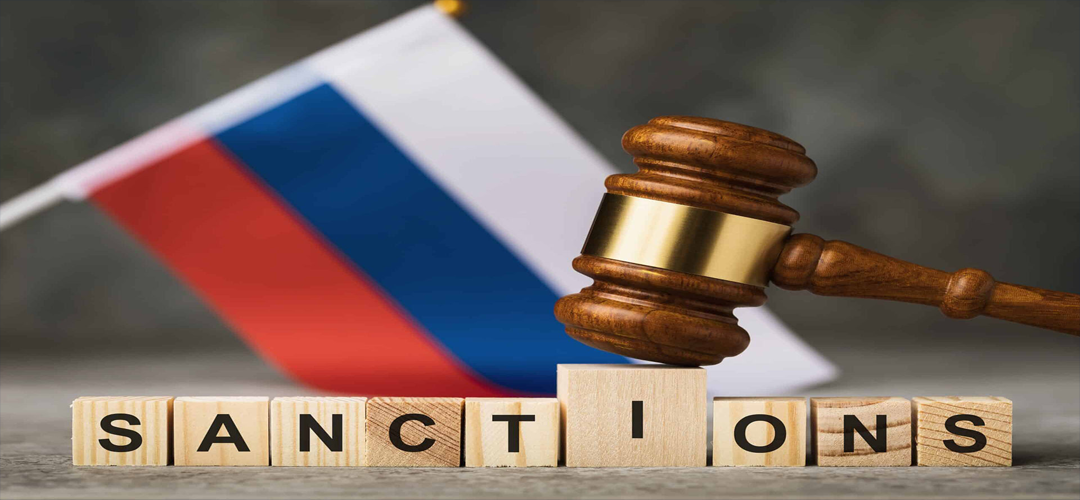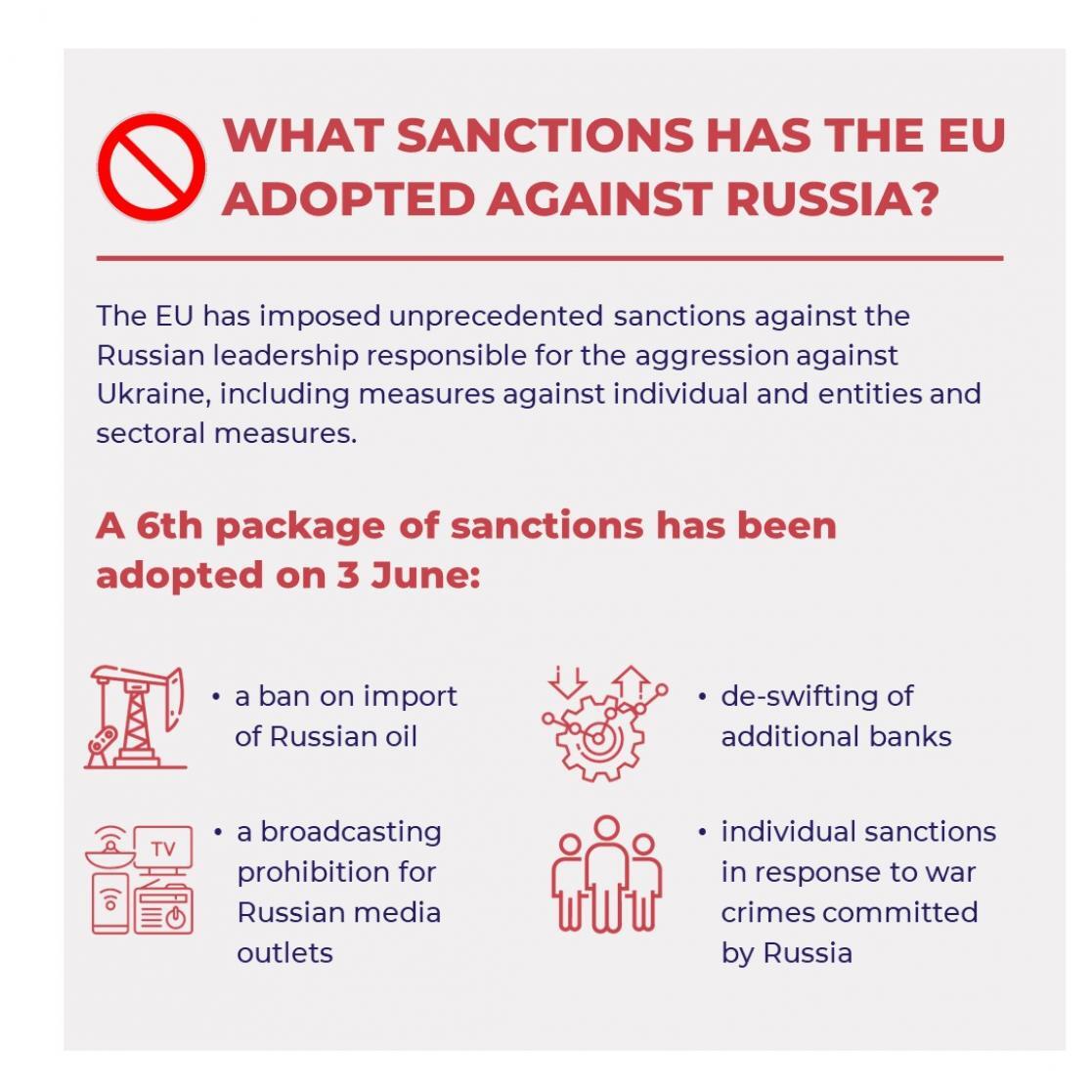Are Sanctions Effective?
March 4, 2023 | Expert Insights

On the one-year anniversary of the Russian-Ukrainian conflict, the European Union announced a fresh set of sanctions on Russia. The fresh bouquet has tried to outdo the earlier version. It includes additional export bans worth $11 billion, controls on 47 new electronic components used by the Russian military, and blacklisting individuals, including military commanders. In its most comprehensive sanctions package yet, the EU has also included seven Iranian entities supplying drones to the Russian military.
Will these force President Putin to come to the negotiating table, allowing his expensive military gamble to go unfinished?
Background
In the past year, successive sanctions have been placed on Russia from a combination of nations – the EU, the G7 coalition, the U.S. and the UK. The first set of sanctions, as an immediate response to the invasion, was banning all Russian oil, gas, and coal imports by the U.S., which accounted for 8 per cent of all imports in 2021. The UK declared its resolve to phase out Russian oil imports through the course of the year 2022 (8 per cent of its oil and 18 per cent of its diesel).
As for the EU, which accounted for at least 35 per cent of Russia’s oil and gas exports, they pledged to find alternative sources for these imports. In June 2022, the EU issued a complete ban on all crude oil and petroleum product imports from Russia via sea and banned EU-based companies from engaging in maritime transport for any petroleum cargoes from Russia. However, a fear of global oil prices skyrocketing after the implementation of these sanctions prompted a minor rollback on them. The G7 countries imposed a price cap of $60 per barrel of crude oil, which allowed them to ban all flows from Russia unless they were priced at or below the cap.
The next set of sanctions imposed on Russia was financial in nature. Since February 2022, the U.S. has introduced restrictions on transactions with Russia’s central bank, its Ministry of Finance and the National Wealth Fund. American financial institutions have also banned transactions with Russia's central bank and Ministry of Finance. The EU also initiated the ban on SWIFT (the international financial transfer system) to prevent its usage by Russian financial institutions. Several international companies like Shell, British Petroleum, Starbucks, Apple, McDonald's, and Volkswagen have removed all stores and offices from Russia or severely reduced operations and services offered in the country. According to a report by Yale, over 1000 companies have ceased operating in some manner in Russia since the invasion in February 2022.

Analysis
The potential weight of the economic sanctions on Russia led western economists to predict the Russian economy shrinking by 15 per cent or more in 2022. Recent reports released by the International Monetary Fund, the World Bank and the Organisation for Economic Cooperation and Development (OECD) say otherwise – Russia’s economy shrank by 2.2 per cent in 2022. Most of the effects of the sanctions were mitigated by Russia’s oil exports contributing to a trade surplus of over $600 billion – gained through alternative suppliers in countries outside of those imposing sanctions, like India and China. The EU’s ban on trade in oil and gas with Russia wasn’t completely halted – 15 per cent of all EU energy imports were from Russia in 2022.
Banning the use of SWIFT for Russian financial institutions was a harsh blow because of the lack of access Russian banks would have to the international financial system. The Russian central bank was also wary of the threat of inflation and continuously cut interest rates to ensure that a banking collapse would not occur. Furthermore, due to steady income from exports and imports decreasing rapidly (because of several suppliers being banned from selling to Russia), the country had a large trade surplus of more than $227 billion in 2022. Russia was able to diversify its buyers for oil and gas beyond the U.S., the UK and Europe to countries like India and China. It used third-party countries like Kazakhstan to continue exporting oil and gas products. China is also an important trade partner for Russia ($180 billion according to Chinese data), with Russia using the yuan to conduct foreign transactions as opposed to the dollar or pound.
Within Russia, consumers were unwilling to spend and make purchases due to the pulling out of several companies, which reduced their expenditures. Instead, due to the wartime context, most of the Russian population decided to save more, pumping money into the banking system in the country and allowing for greater public spending by the Russian government. Over 5.5 million roubles (around 4 per cent of the GDP of 2021) were injected into the Russian economy, protecting it from potential shock due to its forced withdrawal from the international financing system.
Russia is well-suited to adapting to economic and financial crises since the fall of the Soviet Union. Furthermore, since the annexation of Crimea in 2014, Russia has been preparing to protect its economy and people from such sanctions through 'anti-crisis packages', which include hyper-centralization and accumulation of resources for import substitution. The tactic of using locally produced raw materials and goods is one employed by Russia's government, considering high-quality foreign products are unavailable for purchase by consumers.
The IMF's forecast for Russia in 2023 predicts economic growth of 0.3 per cent - indicating that continued sanctions may not debilitate the Russian economy, as intended by the combination of financial and trade sanctions. On the other hand, the OECD and World Bank continue to forecast declining income growth for Russia – 5.5 per cent in the worst-case scenario from the OECD and 3.3 per cent according to the World Bank.
Although a recession hasn't hit the Russian economy yet, the growth of several industries, like the automobile industry and the production of household goods in the country, has been halted because of Russia's inability to import separate parts for their production. The car market in Russia shrunk by 60 per cent, even though it could find alternative importers in China. Production may be impacted due to a lack of human capital – most able-bodied Russians are being deployed to the frontlines in the war efforts or have fled to escape this potential draft. The Russian economist Oleg Vyugin highlighted the impact of a shortage of human capital in a report from the Gaidar Institute – the largest shortfall was recorded in the following industries - light industry enterprises (-70%), mechanical engineering (-35%) and food production (-25%).
Assessment
- As sanctions continue to be enforced by the West, the Russian economy will continue to protect itself from outside markets and look inward. A rollback to Soviet-era economics may result in further isolation from the global economy, increased spending on defence and military expenditure and a rapid decline in productivity in the Russian economy. The Russian central bank may also look to start increasing rates to combat the consequences of a growing budget deficit – it has stated it is more likely to increase interest rates from 7.5% this year than to decrease them.
- Through the course of the last year, Russia has managed to survive the onslaught of sanctions imposed on its trade and economy from the West. But further sanctions may address those loopholes that allowed Russia to mitigate the effects of these sanctions. The impact of these sanctions has been hidden by Russia's careful planning and strategizing – it remains to be seen if this continues in 2023.








Comments